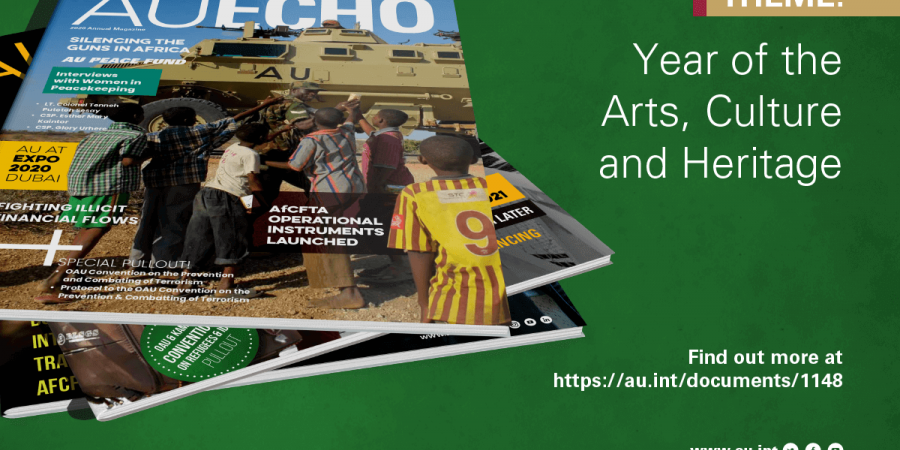Call for Papers: AU-ECHO 2021 EDITION
Aspiration 5 of Agenda 2063 envisions an Africa with a strong cultural identity, common heritage, shared values and ethics. This calls for an African cultural renaissance which is pre-eminent and that inculcates the spirit of Pan Africanism; tapping Africa’s rich heritage and culture to ensure that the creative arts are major contributors to Africa’s growth and transformation; and restoring and preserving Africa’s cultural heritage, including its languages.
The size of the global market for creative goods has expanded substantially more than doubling in size from U$208 billion in 2002 to $509 billion in 2015.( UNCTAD Creative Economy Outlook Report 2018). However Africa’s contribution to the creative economy is significantly small and at a country level, the contribution of creative sectors to the national economy is hardly visible.
With adequate investment, the Creative Economy and industries can support sustainable economic growth through increased productivity, competitiveness, job creation/employment and trade through the creation of markets of goods and services for both domestic and export consumption.
Whereas Africa has rich and diverse arts and cultural heritage the resulting cultural services, products, activities and events are either insufficiently funded or not at all and may in some instances incur heavy taxes. Other issues impacting the African creative industry include lack of access to global markets, the fragmented nature of the industry structured around micro-enterprises, investment in education, the emergence of new technology/digitisation, limited commercialisation of African cultural and artistic creations leading to the impoverishment of the cultural heritage of countries and the intellectual property issues arising from poor copyright and trademark protection and the resulting trend in “cultural appropriation” as African cultural designs and artefacts and even languages are appropriated for the benefit of non-African commercial entities.
In addition, barriers to trade arising from financial and human resource limitations and preferential treatment for local has hampered the ability of African cultural products and services to penetrate the creative sectors of more advanced economies while being a larger importer of their cultural products.
In recognition of the importance of Culture, Arts and Heritage in promoting the objectives of Agenda 2063 to achieve sustainable economic growth and development; and the need to enhance the role that the creative economy and industries will play in in this endeavour, the AU Heads of State and Government declared the Year 2021 as The AU Year of the Arts, Culture And Heritage.
The Declaration of 2021 as the Year of the Arts, Culture And Heritage will ensure that at continental, regional and national levels the African Union, its member states and Regional Economic Communities (RECs) working with partners in both public and private sector, will allocate the necessary resources and implement the relevant policies and programmes towards establishing a more robust and sustainable creative industries sector. In addition, the Theme of the year 2021 will enable the increased advocacy for the ratification of the Charter for African Cultural Renaissance (which to date has only been ratified by 14 of the 55 member states), the implementation of the Plan of Action on Cultural and Creative Industries in Africa which aims to promote the safeguarding, organisation, production, marketing, distribution, exhibition and preservation of African cultural and creative industries as well as the teaching of the arts and the AU Model Law on the Protection of Cultural Property and Heritage which aims to implement the legislative guidelines for the preservation and protection of Africa’s arts and cultural heritage and industries.
Referencing the various African Union Charters and policy instruments relevant to the sector as well as other documented pronouncements and actions by the African Union, and in line with the Theme the Year of the Arts, Culture and Heritage, interested parties are hereby called upon to submit for the 2021 Edition of the AU Echo, incisive and evidence-based articles on the creative economy and Africa’s Creative Industries, the potential and progress made in the various sectors as well as innovative initiatives that are being undertaken at institutional, country and continental level to promote the growth of creative industries.
SUBMISSION REQUIREMENTS & DEADLINE
- Contributions will be accepted from institutions, organs and employees of the African Union, AU member states, academic institutions, think tanks, civil society organisations and representative groups (e.g. women, youth), industry experts and the wider public. The editors reserve the right to reject papers they deem to be inconsistent with the guidelines outlined in this call for papers.
- Languages: Articles for publication may be submitted in any of the AU working languages i.e. English, French, Portuguese and Arabic.
- Word count: Not more than 2000 words per article.
- Images: Photographs and other illustrations that enhance the article are welcome, although these must be original to the author and/or under a creative commons license. Captions must be provided.
- All submissions must contain the full name and contact of the sender, his/her organization / job title (if applicable).
- Submissions will only be accepted through email which must be titled as given below and can only be submitted through the email accounts listed below for consideration.
-
Title / subject of email: SUBMISSION – AU ECHO 2021- (INSERT TITLE OF ARTICLE)
-
Receiving emails:
Send all manuscripts and correspondence to :
-
-
DEADLINE FOR SUBMISSION : Manuscripts must be received by by 17.00 East African Time (GMT+3) on 15th August 2020
About the AU ECHO
The AU ECHO provides a platform for the 55 Member States of the African Union, and African citizens to profile the successes of Africa, and to impart knowledge and experiences borne from African led initiatives, based on the instruments and decisions of the African Union. It is published on an annual basis by the Directorate of Information and Communication of the AUC with content largely related to the AU’s Theme of the Year.
The AU ECHO is distributed to AU Heads of State and Government, Ministers, senior policymakers delegates, and media during the AU Summits and other substantive meetings and conferences as well as to offices of the African Union. Distribution is also made to development partner organisations and Consulates / Embassies in Addis Ababa. Soft copies are posted online on www.au.int.



